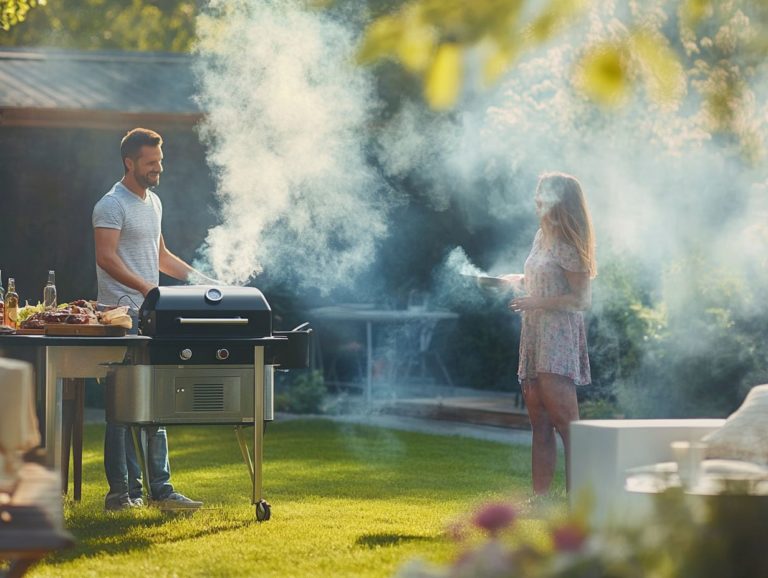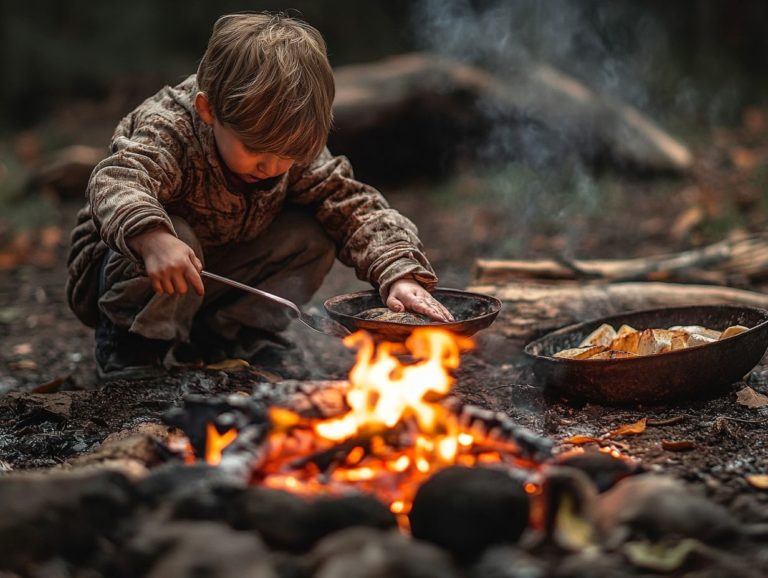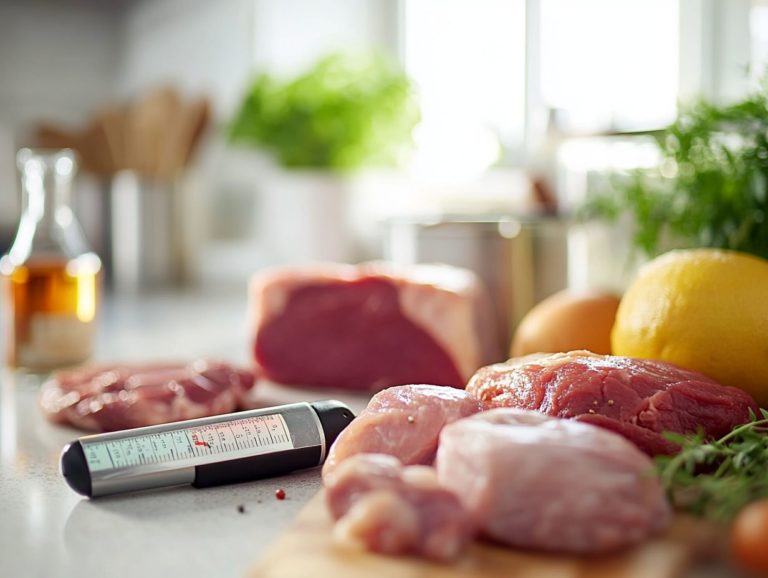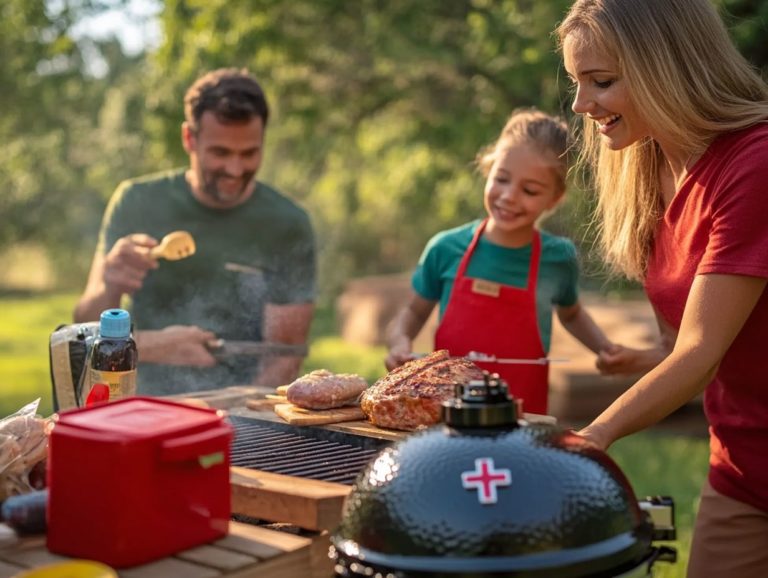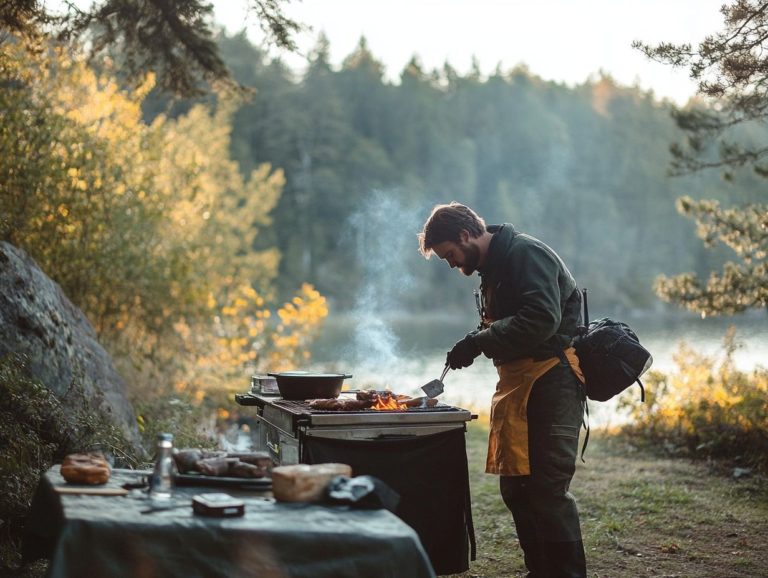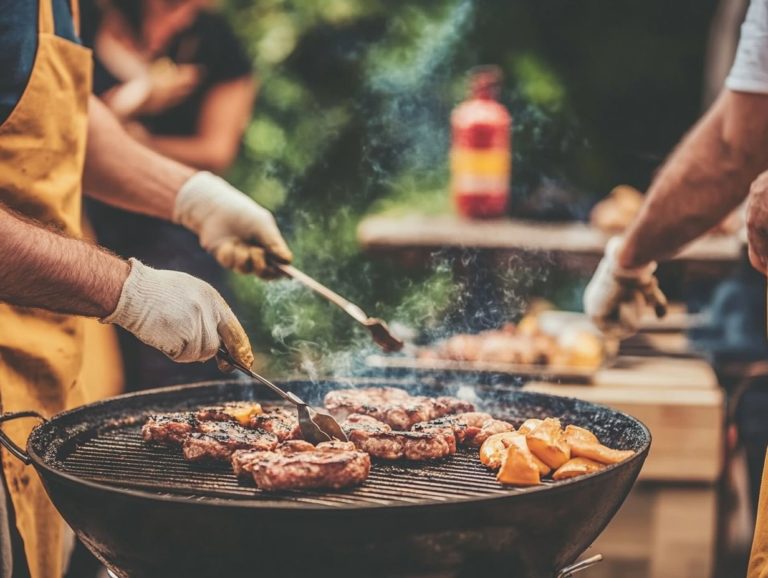Tips for Keeping Food Safe on the Grill
Grilling season is not just about savoring mouthwatering meals and enjoying the great outdoors; it also comes with the important responsibility of maintaining food safety.
You ll find essential tips for safe grilling, from prepping your grill and selecting the right utensils to mastering crucial cooking techniques.
Understand how to handle various meats and vegetables, and gain vital insights into recognizing and managing foodborne illnesses.
Get ready to take your grilling to the next level while ensuring the safety of your loved ones!
Contents
- Key Takeaways:
- The Importance of Proper Food Handling
- Preparing for Safe Grilling
- Safe Grilling Techniques
- Food Safety Tips for Different Types of Meat
- Dealing with Foodborne Illnesses
- Frequently Asked Questions
- What are some basic tips for keeping food safe on the grill?
- Why is it important to preheat the grill before cooking?
- How can I prevent cross-contamination by using separate cutting boards for raw meats and cooked food when grilling?
- What is the best way to keep hot food safe on the grill?
- What should I do with leftover food from the grill?
- What essential food safety tips ensure enjoyable summer grilling experiences?
Key Takeaways:
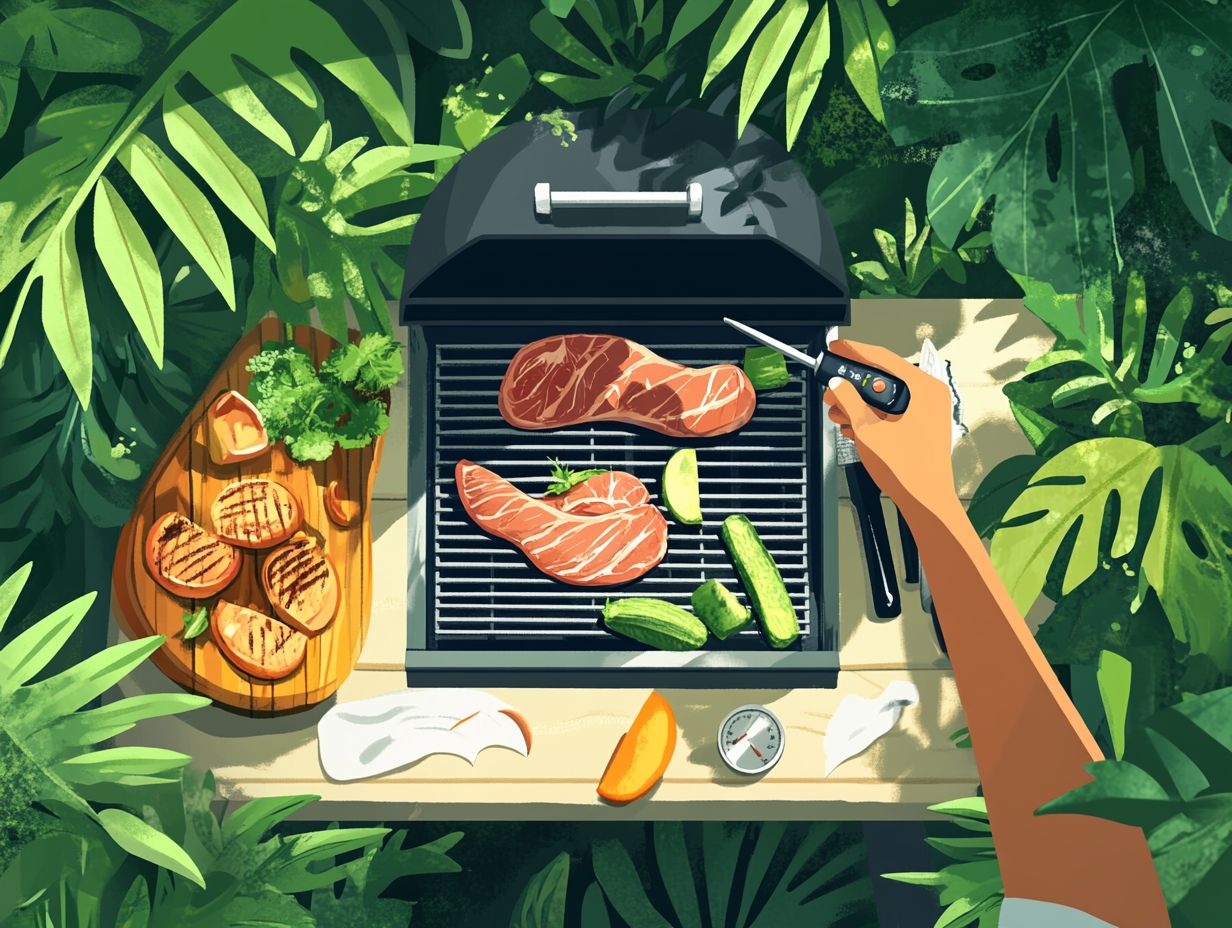
- Proper food handling is crucial to keep your loved ones safe from foodborne illnesses.
- Keep your grill clean and well-maintained, and use the right utensils to prevent mixing raw meat with other foods.
- Follow proper cooking temperatures and handle raw and cooked foods separately, especially when grilling different types of meat.
The Importance of Proper Food Handling
Proper food handling is essential, particularly during the summer months when backyard cookouts are in full swing.
With the increase in outdoor gatherings, the risk of foodborne illnesses also rises. It is imperative for anyone involved in food preparation to grasp and apply safety measures.
This means keeping your hands clean, using the right cooking utensils, and following guidelines from food safety experts, like Melissa Wright from Virginia Tech, along with organizations like the USDA and FDA.
By following these practices, you can ensure a safe and enjoyable culinary experience for everyone.
Preparing for Safe Grilling
Preparing for a safe grilling experience requires careful attention to key steps that minimize the risks of foodborne illnesses during summer cookouts.
Focus on maintaining proper temperature control, marinating foods safely, and ensuring that every aspect of food preparation meets the highest hygiene standards.
Be mindful of potential hazards, such as mixing raw meat with other foods, to ensure a seamless and enjoyable grilling experience.
Cleaning and Maintaining the Grill
Cleaning and maintaining your grill is essential for preventing foodborne illnesses during summer cookouts. Residue from previous grilling can harbor harmful bacteria.
Make it a habit to scrub your cooking utensils regularly and ensure that the grilling surface is sanitized, upholding the highest hygiene and food safety standards.
Opt for cleaning agents that are safe for food contact surfaces to effectively remove all remnants of grease and char.
After each use, inspect for any damage like rust or cracks to prevent potential hazards while cooking.
Sanitizing utensils, particularly those that come into contact with raw proteins, is vital in avoiding cross-contamination.
Always remember to maintain clean hands throughout the grilling process to safeguard against the spread of harmful germs.
By following these best practices, you can enjoy a worry-free grilling experience, allowing you to focus on delicious meals with friends and family.
What are your best grilling safety tips? Share your experiences with us!
Choosing the Right Utensils
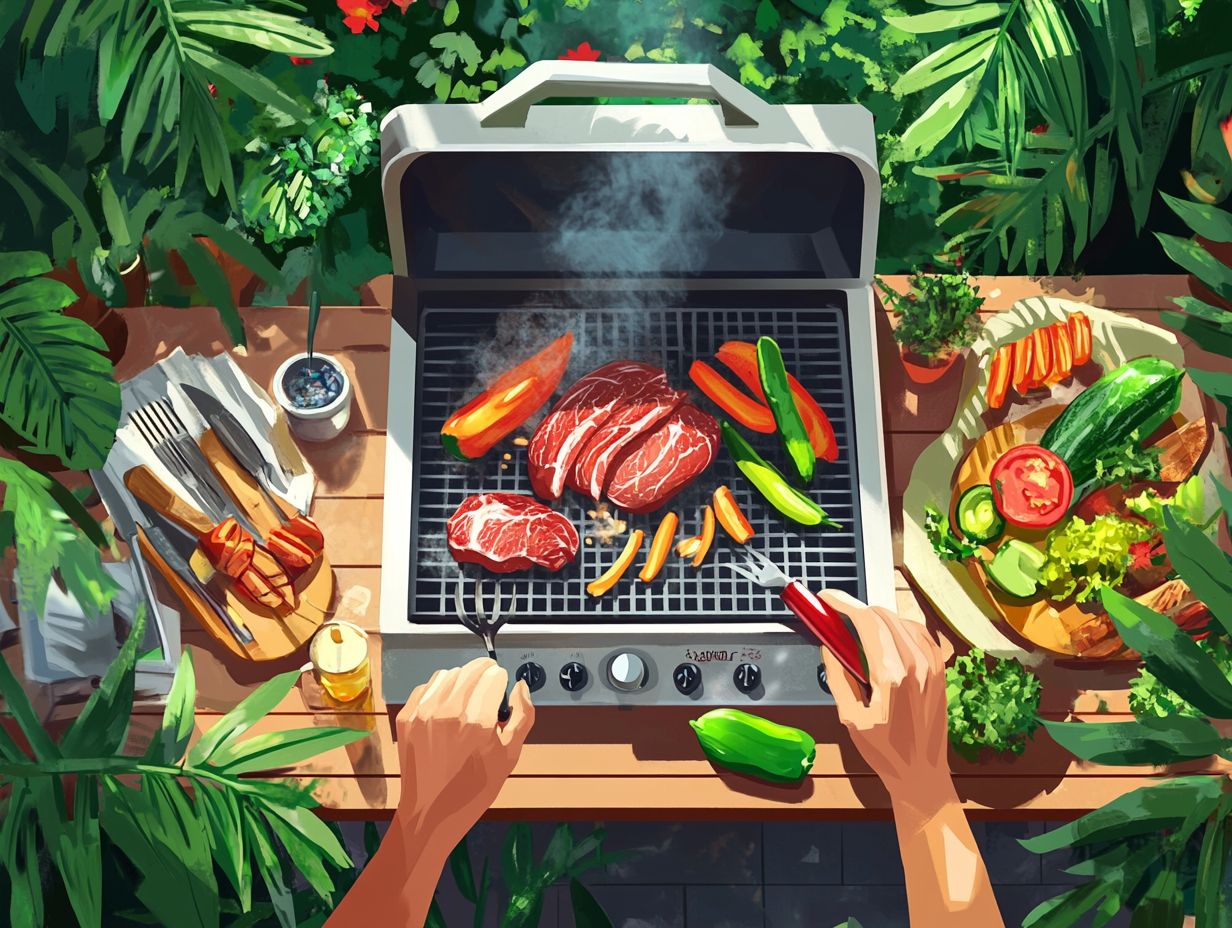
Choosing the right cooking utensils is essential for ensuring food safety, particularly when you’re handling raw meats and seafood during those summer grilling sessions. It s wise to designate specific utensils for different food types to prevent mixing raw and cooked food.
Opt for materials that don’t absorb liquids, which are easy to clean and sanitize. Using separate tools is very important; this not only preserves the integrity of your food but also significantly reduces the risk of foodborne illnesses, safeguarding your health.
For instance, dedicated cutting boards are invaluable. Consider those crafted from bamboo or high-density polyethylene, which resist bacteria and don t easily harbor germs. Stainless steel or silicone utensils are also excellent choices, as they can withstand high temperatures and remain non-reactive, making them perfect for both cooking and serving.
Choose utensils based on the food type to improve meal quality and kitchen safety.
Safe Grilling Techniques
Grill safely this summer to enjoy your food without worry! Utilizing safe grilling techniques is essential for preventing foodborne illnesses, especially during the summer when grilled delights take center stage at backyard gatherings.
By using a food thermometer to accurately gauge the internal temperature, you can ensure that meats like burgers, chicken, and seafood are cooked to perfection. This not only enhances flavor but also significantly reduces health risks linked to undercooked foods.
Proper Temperature and Cooking Times
Understanding the proper temperatures and cooking times is critical when you re grilling. Keeping your food out of the temperature danger zone, which ranges from 40 F to 140 F, is essential for food safety. Make sure it’s cooked thoroughly to the recommended internal temperatures to eliminate harmful bacteria.
Maintaining safe cooking temperatures is essential for anyone who enjoys preparing food. For instance, ensure that beef reaches an internal temperature of at least 145 F, while ground meats need to hit 160 F for safety. In terms of poultry, such as chicken and turkey, you must cook it to a minimum of 165 F. Don t overlook seafood fish should ideally be cooked to 145 F too.
To elevate your food safety game even further, remember to keep hot foods at or above 140 F and ensure cold foods stay at 40 F or below. By following these guidelines, you can significantly reduce the risk of foodborne illnesses, ensuring that your meals are not only delicious but also safe for everyone to enjoy.
Handling Raw and Cooked Foods
Handling raw and cooked foods correctly is essential to avoid cross-contamination during your grilling and food preparation adventures. It s crucial to use separate plates and utensils for raw meats and cooked foods. Adhering to safety tips ensures you manage food safely and effectively during those vibrant summer cookouts.
To fully embrace these practices, consider using color-coded cutting boards one for raw proteins and another for fruits and vegetables. This not only streamlines your process but also minimizes any risks associated with mixing raw and cooked food.
Maintaining a clean workspace is equally vital. Regularly sanitizing surfaces and storing raw ingredients below cooked items in the fridge can significantly reduce the chance of harmful bacteria spreading.
Always wash your hands thoroughly between handling different types of food, and don t forget to cook meats to their recommended temperatures to guarantee complete safety.
Follow these easy steps for a worry-free grilling experience!
Food Safety Tips for Different Types of Meat
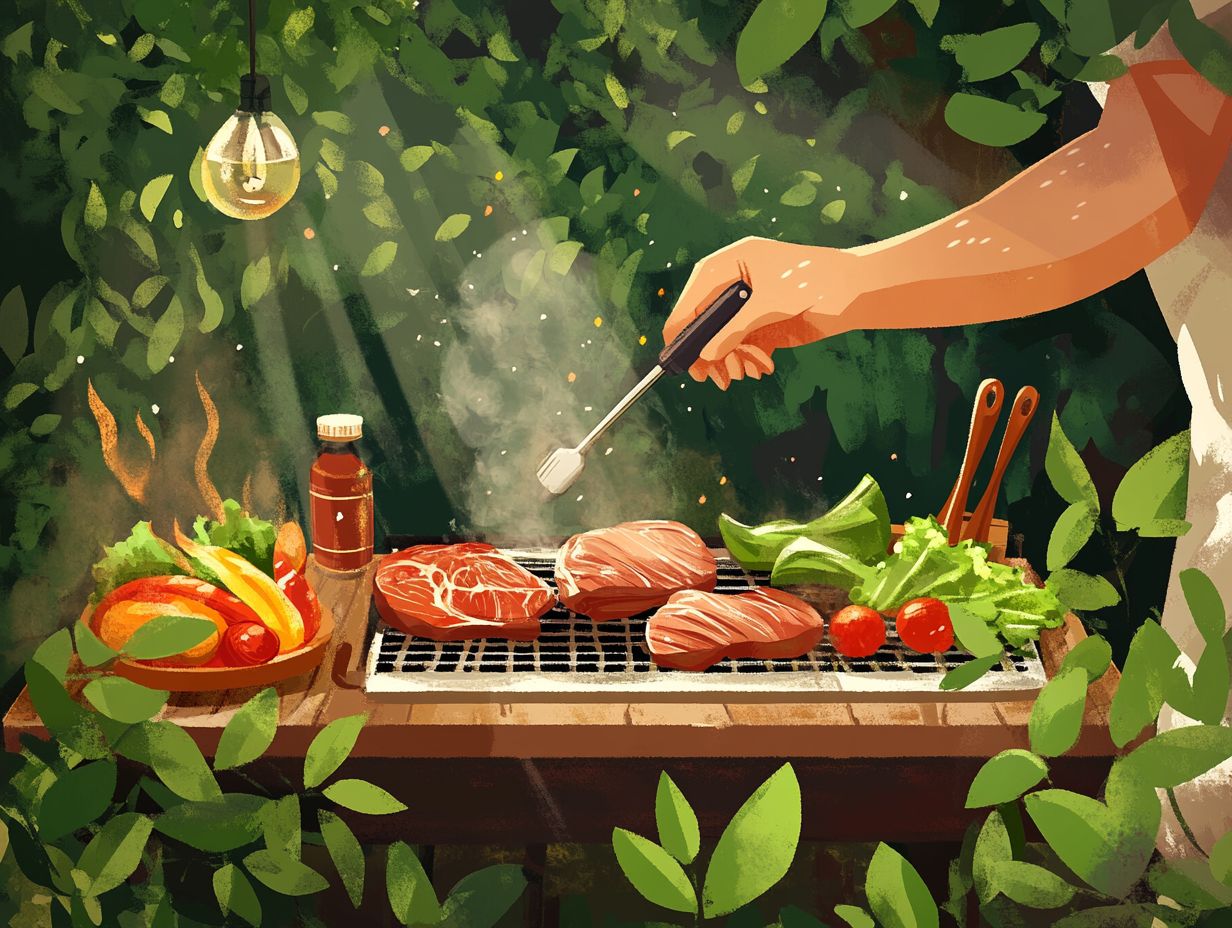
Implementing food safety tips tailored to various types of meat is essential for safeguarding against foodborne illnesses during your summer grilling adventures. Each category beef, poultry, fish, and even vegetables comes with its own unique handling and cooking requirements.
How can you ensure food stays safe? Let s explore safe grilling techniques. Adhering to these guidelines is crucial to ensure the utmost consumer safety and enjoy your outdoor feasts without worry.
Beef, Poultry, Fish, and Vegetables
When grilling beef, poultry, fish, and vegetables, it s vital to adhere to food safety protocols. This includes marinating safely and ensuring you meet the appropriate cooking times and internal temperatures. Each type of food comes with its own specific guidelines designed to maximize flavor while keeping safety as a top priority.
For example, when marinating, always use the refrigerator to prevent bacterial growth; never let the marinated items sit out at room temperature. Beef should reach an internal temperature of at least 145 F, while ground meat requires a minimum of 160 F to eliminate harmful pathogens. Poultry is particularly sensitive and must be cooked thoroughly to 165 F. Fish should hit at least 145 F, and when grilling vegetables, simply cook them until they re tender, being careful to avoid cross-contamination with raw meats.
By following these guidelines, you can enjoy delicious meals. You can also have peace of mind about food safety.
Dealing with Foodborne Illnesses
Navigating the realm of foodborne illnesses demands your keen awareness of symptoms and the right treatment methods to safeguard your health this summer. Stay alert, especially during those backyard cookouts, as improper food handling can lead to common signs of illness.
Pay close attention to symptoms like nausea, vomiting, and diarrhea; addressing these promptly is essential for your well-being.
Symptoms and Treatment
Recognizing the symptoms of foodborne illnesses is essential. This ensures prompt treatment and a swift recovery, particularly after those summer gatherings filled with grilled delights.
You should be on the lookout for classic signs like stomach problems, fever, and fatigue, as knowing how to respond can greatly influence your health outcomes.
Understanding these symptoms can enhance your ability to diagnose issues; for example, some individuals might experience headaches or muscle aches depending on the specific pathogen at play. Certain foodborne illnesses, such as salmonella, can lead to serious complications if not treated quickly, making vigilance crucial.
Immediate care involves hydration and rest. Proper hygiene practices can help keep cold food safe during summer events, but if things get severe, you might need to seek medical help or even specific antibiotics (medicines that fight bacterial infections).
Preventative measures are equally important think proper food storage for leftovers, including items like grilled food, seafood, and vegetables, thorough cooking, and maintaining cleanliness in food prep to ensure that raw meats are handled safely, including the use of clean hands during food preparation. Keep your gatherings safe and enjoyable by taking these steps.
Frequently Asked Questions
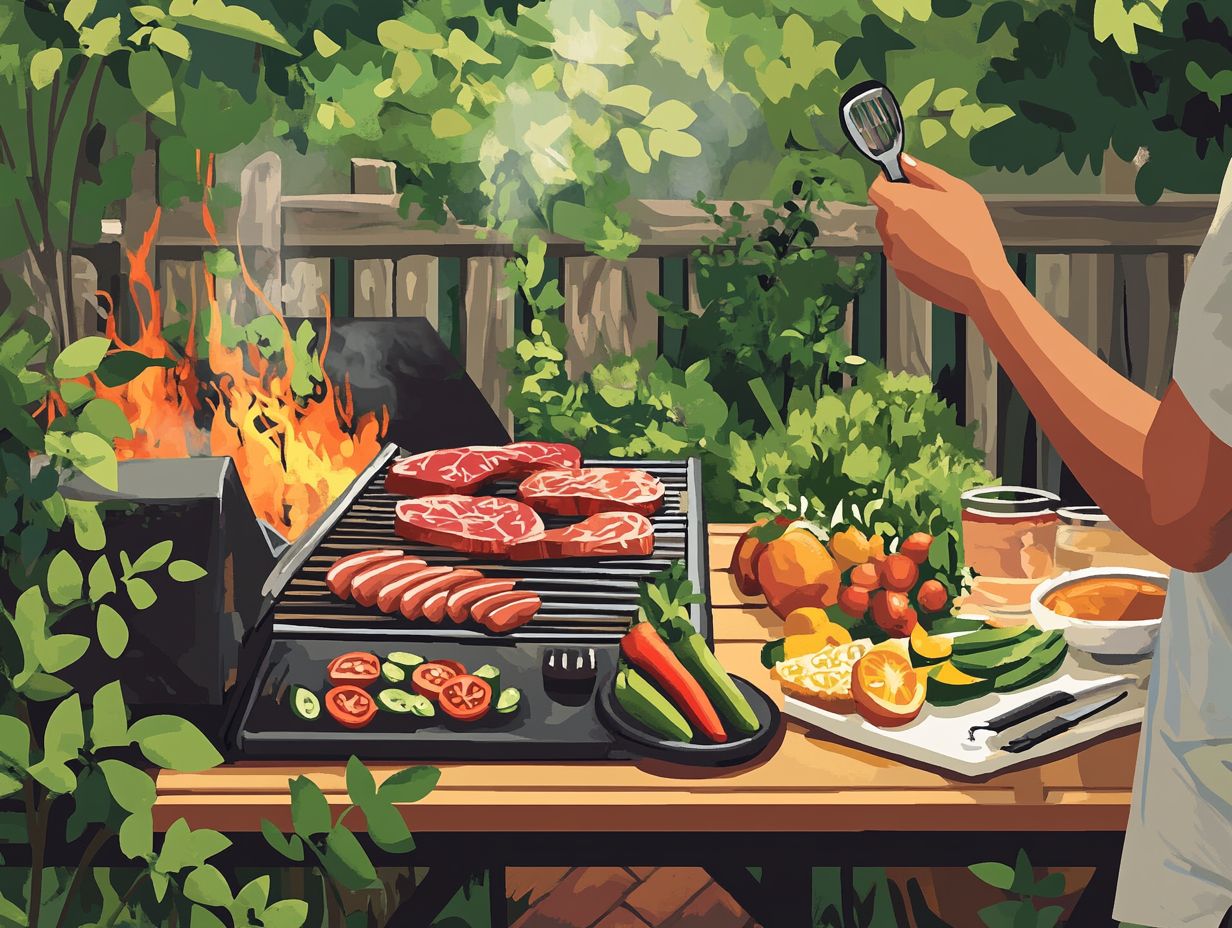
What are some basic tips for keeping food safe on the grill?
Keep food safe on the grill by preheating it, using separate cutting boards and utensils for raw and cooked food, and ensuring hot food is kept above 140 F while cold food remains below 40 F. For more guidance, check out these top outdoor cooking safety tips for beginners.
Why is it important to preheat the grill before cooking?
Preheating the grill ensures that it reaches the proper temperature for cooking food safely. This also helps to kill any bacteria that may be present on the grill grates.
How can I prevent cross-contamination by using separate cutting boards for raw meats and cooked food when grilling?
To prevent cross-contamination, use separate cutting boards and utensils for raw and cooked food. Make sure to clean any surfaces that have come in contact with raw meat before using them for other food items.
What is the best way to keep hot food safe on the grill?
Hot food should be kept at a temperature above 140 F to prevent bacterial growth. Use a food thermometer to accurately check the internal temperature of grilled food.
Follow these tips for a summer filled with safe and delicious BBQs!
What should I do with leftover food from the grill?
Leftover food should be placed in shallow containers and refrigerated within 2 hours of cooking. Do not leave food out at room temperature for more than 2 hours, or 1 hour if the temperature is above 90 F.
What essential food safety tips ensure enjoyable summer grilling experiences?
Soak food in a flavorful mix in the refrigerator. Always use a clean plate for cooked food.
Never use the same mix for raw and cooked food. Always wash your hands before and after handling food.
Follow these tips to keep your summer grilling safe and delicious! Enjoy your meals without worry!

